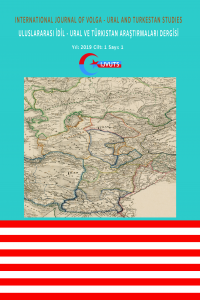Abstract
Gülmeyi seven Özbek halkının sözlü edebiyatının mizah dalını oluşturan türlerden birisi äskiyä sanatıdır. Bu sanat hâlen etkin biçimde yaşatılmaktadır. Äskiyä sanatı için “İki veya daha fazla äskiyäçinin kelimelerdeki çokanlamlılığa dayanarak birbirlerine laf çarpmaları temelinde gerçekleştirdikleri, söz söyleme ustalıklarını sergiledikleri söz oyunudur.” denebilir. Bu oyunda klasik edebiyatta yer alan iham, tecnis gibi sanatlardan istifade edilir. Äskiyä sanatı üzerine Özbekistan’da değişik çalışmalar yapılmış, gerekli derlemeler gerçekleştirilmiştir. Äskiyä sanatı, hâlihazırda Özbekistan’da halka yönelik gerçekleştirilen İstiklal Bayramı ve Nevruz Bayramı başta olmak üzere değişik resmi etkinlikler yanında özel toplantılar, düğünler gibi her türlü gayri resmî eğlenceli ortamda sergilenmektedir. Bu oyuna iştirak edene äskiyäçi veya äskiyäbåz denmektedir. Äskiyäçilerin söz ustası olması kadar söylenen sözleri kaldırabilmesi de temel kuraldır. Birden çok äskiyäçinin bulunduğu oyunlarda kişiler arasında laf atma konusunda kinci, ısrarlı ve takipçi üslup sergilenmez. Bir äskiyäçinin laf attığı kişi kendisine söz söyleyene münasip bir cevap verebileceği gibi başka bir äskiyäçiye de kendisi laf atabilir.
Keywords
References
- Ähmedova, N. (2012). “Gulmisiz, Rayhånmisiz?” Özbekistån Ädäbiyåti vä Sän’äti Gazetasi, yıl 2012, sayı 1.
- Baydemir, H. (2016). Askiya Şekilleri ve Benzer Türlerle Mukayesesi, A. Ü. Türkiyat Araştırmaları Ensitüsü Dergisi [TAED] 56, Erzurum. s. 903-921.
- Entsiklopedik Luğät. (1988). Komisyon. c. 1., Taşkent: Özbek Sovet Entsiklopediyasi
- Mädäyev, Å.. ve Såbitov, T. (2010). Xälq Åğzäki Poetik İcådı. Taşkent: Şärq Näşriyåt.
- Muhämmädiyev, R. (1970). Äskiyä. Taşkent: Ğäfur Ğulåm.
- Özbek Tilining İzåhli Luğäti 4 cilt. (2006). Komisyon. Taşkent: Özbekistån Milliy Entsiklopediyasi
- Özbek Xälq Åğzäki Bädiiy İcådı fänidän mä’ruzälär mätni, Özbek tili vä ädäbiyåtı tä’lim yönälişi üçün. (2011) Nukus: Özbekistån Respublikası Xälq Tä’limi Väzirligi.
- Rähmätulläyev, Ş. (2003). Özbek Tilining Etimologik Luğäti II (äräb sözläri vä ulär bilän håsılälär). Taşkent: Universitet.
- Räsulov, R., Husänov, N. ve Moydinov, Q. (2006). Nutq Mähåräti. Taşkent: Özbekistån Respublikasi Åliy vä Ortä Mäxsus Tä’lim Väzirligi.
- Yıldız, N. (2006). Özbek Halk Edebiyatında Latife, Laf, Askıya” I. Türkiyat Araştırmaları Sempozyumu Bildiriler. Hazırlayanlar: Yunus Koç, Serdar Sağlam ve Cahit Gelekçi. Ankara: Hacettepe Üniversitesi Türkiyat Araştırmaları Enstitüsü. s. 99-105.
- Yılmaz, M. (2014). Türk Dünyası Somut Olmayan Kültürel Mirasları Envanter Çalışması. Ankara: Hoca Ahmet Yesevi Uluslararası Türk-Kazak Üniversitesi.
- http://uchildiz.uz/äskiyä-aslikni-xushlaydi/ 12.10.2015
- http://n.ziyouz.com/portal-haqida/xarita/maqolalar/nazokat-ahmedova-gulmisiz-rayhonmisiz 11.09.2015
- https://ich.unesco.org/en/RL/askiya-the-art-of-wit-00971 ve https://meros.uz/object/askiya# 12.10.2015.
Abstract
One of the genres of humor in the oral literature of the Uzbek people who love to laugh is äskiyä art. This art is still being alive. Äskiyä art can be defined as “The art of wit which involves two or more participants (askiyachi) who demonstrates their mastery of witticism using polysemy in the words in the form of dialogue”. The arts of classical literature such as “iham”, “tecnis” are employed in this game. Different works have been done in Uzbekistan on the art of Äskiyä and necessary compilations have been made. The art of Äskiyä is demonstrated in all kinds of informal entertaining environments such as special meetings and weddings, as well as various official events, especially on the Independence Day and Nowruz Feast, which are organized for the public in Uzbekistan. The participants of this game are called “äskiyäçi” or “äskiyäbåz”. The main rule is that “Äskiyäçi” should be able to concede all the words delivered by other participants. In the games where there are more than one “äskiyäçi”, there is no resentful, insistent and pursuer style among participants. “Äskiyäçi” may not only come up with an answer to the person who addressed a word to him, but address his words to another “äskiyäçi” as well.
Keywords
References
- Ähmedova, N. (2012). “Gulmisiz, Rayhånmisiz?” Özbekistån Ädäbiyåti vä Sän’äti Gazetasi, yıl 2012, sayı 1.
- Baydemir, H. (2016). Askiya Şekilleri ve Benzer Türlerle Mukayesesi, A. Ü. Türkiyat Araştırmaları Ensitüsü Dergisi [TAED] 56, Erzurum. s. 903-921.
- Entsiklopedik Luğät. (1988). Komisyon. c. 1., Taşkent: Özbek Sovet Entsiklopediyasi
- Mädäyev, Å.. ve Såbitov, T. (2010). Xälq Åğzäki Poetik İcådı. Taşkent: Şärq Näşriyåt.
- Muhämmädiyev, R. (1970). Äskiyä. Taşkent: Ğäfur Ğulåm.
- Özbek Tilining İzåhli Luğäti 4 cilt. (2006). Komisyon. Taşkent: Özbekistån Milliy Entsiklopediyasi
- Özbek Xälq Åğzäki Bädiiy İcådı fänidän mä’ruzälär mätni, Özbek tili vä ädäbiyåtı tä’lim yönälişi üçün. (2011) Nukus: Özbekistån Respublikası Xälq Tä’limi Väzirligi.
- Rähmätulläyev, Ş. (2003). Özbek Tilining Etimologik Luğäti II (äräb sözläri vä ulär bilän håsılälär). Taşkent: Universitet.
- Räsulov, R., Husänov, N. ve Moydinov, Q. (2006). Nutq Mähåräti. Taşkent: Özbekistån Respublikasi Åliy vä Ortä Mäxsus Tä’lim Väzirligi.
- Yıldız, N. (2006). Özbek Halk Edebiyatında Latife, Laf, Askıya” I. Türkiyat Araştırmaları Sempozyumu Bildiriler. Hazırlayanlar: Yunus Koç, Serdar Sağlam ve Cahit Gelekçi. Ankara: Hacettepe Üniversitesi Türkiyat Araştırmaları Enstitüsü. s. 99-105.
- Yılmaz, M. (2014). Türk Dünyası Somut Olmayan Kültürel Mirasları Envanter Çalışması. Ankara: Hoca Ahmet Yesevi Uluslararası Türk-Kazak Üniversitesi.
- http://uchildiz.uz/äskiyä-aslikni-xushlaydi/ 12.10.2015
- http://n.ziyouz.com/portal-haqida/xarita/maqolalar/nazokat-ahmedova-gulmisiz-rayhonmisiz 11.09.2015
- https://ich.unesco.org/en/RL/askiya-the-art-of-wit-00971 ve https://meros.uz/object/askiya# 12.10.2015.
Details
| Primary Language | Turkish |
|---|---|
| Journal Section | Articles |
| Authors | |
| Publication Date | March 7, 2019 |
| Submission Date | February 8, 2019 |
| Published in Issue | Year 2019 Volume: 1 Issue: 1 |
Cite
International Journal of Volga - Ural and Turkestan Studies
This work is licensed under a Creative Commons Attribution-NonCommercial-No Derivatives 4.0 (CC BY-NC-ND 4.0) International License.


